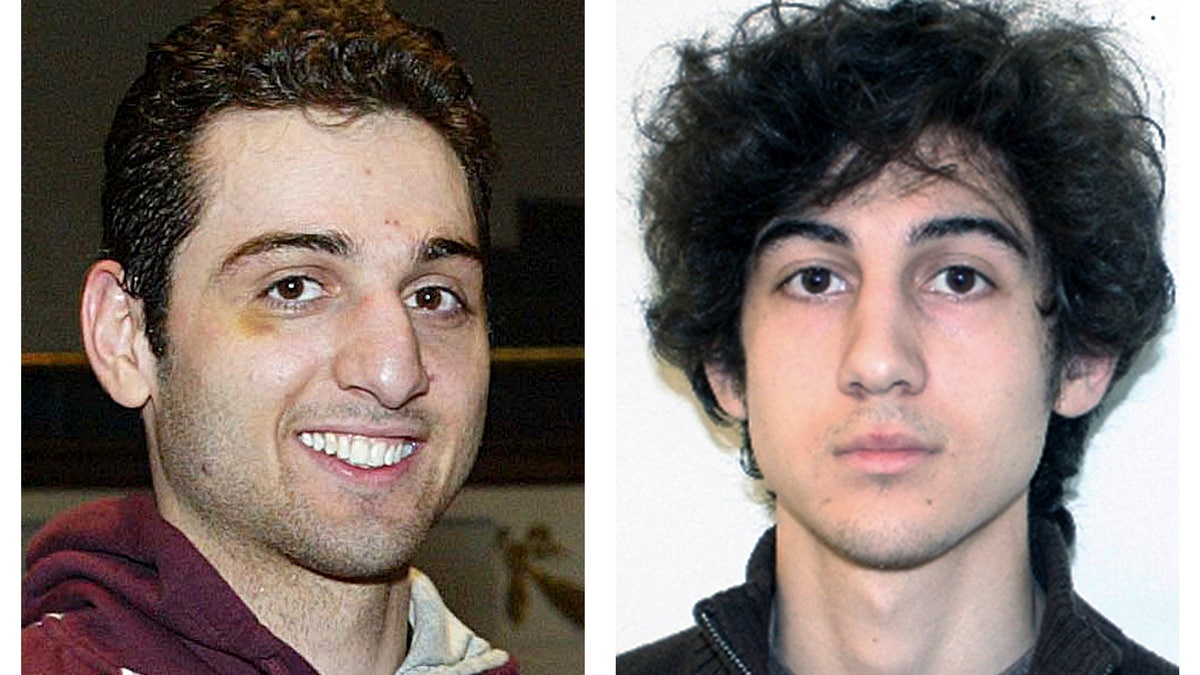
This combination of file photos shows brothers Tamerlan, left, and Dzhokhar Tsarnaev, suspects in the Boston Marathon bombings on April 15, 2013. (AP)
BOSTON – Defense lawyers for Boston Marathon bombing suspect Dzhokhar Tsarnaev are looking for ways to show his deceased older brother was mostly responsible for the tragedy -- a move that, if successful, could save their client's life.
The lawyers asked a judge on Friday to order federal prosecutors to turn over any FBI evidence related to Tamerlan Tsarnaev, hoping the defense can use it to build the case that he was the main instigator behind the deadly attack.
They say in court filings that if Dzhokhar is convicted, jurors could decide whether to give him life in prison or the death penalty based on how they perceive "the brothers' relative responsibility for conceiving and carrying out the attacks." The lawyers believe the jury's decision could rest on "the extent to which it views Tamerlan Tsarnaev as having induced or coerced his younger brother to help commit them."
"For this reason," the defense argued, "any evidence tending to show that Tamerlan supplied the motivation, planning, and ideology behind the Boston Marathon attack, and that his younger brother acted under his domination is material ... and is also subject to disclosure."
The lawyers want records of all FBI contact with Tamerlan, based on information from the Tsarnaev family and unidentified other sources that the FBI asked Tamerlan to be an informant on the Chechen and Muslim communities.
The Boston FBI office declined to comment on the claims made in the court filing but cited a statement released in October in which it said the Tsarnaev brothers were never sources for the FBI, "nor did the FBI attempt to recruit them as sources."
Two explosions at the April 15 marathon killed three people and injured more than 260 others. Tamerlan, 26, died in a shootout with police four days after the attack. Dzhokhar, who was 19 at the time of the bombings, was captured soon after his brother's death and has pleaded not guilty to 30 federal charges, including using a weapon of mass destruction.
More than half the charges carry the possibility of the death penalty. His trial is scheduled to begin in November.
Dzhokhar's lawyers, in their filing, note that a report released this week by the House Homeland Security Committee suggests that government agents monitored Tamerlan and his communications during 2011 and possibly 2012. The report said the FBI Joint Terrorism Task Force conducted a threat assessment of Tamerlan, an ethnic Chechen, in response to a 2011 alert from the Russian government that he was becoming radicalized.
Prosecutors say the Tsarnaev brothers built two pressure cooker bombs and planted them near the marathon's finish line.
The brothers had lived in the former Soviet republic of Kyrgyzstan and the Dagestan region of Russia. They moved to Cambridge with their parents and two sisters about a decade before the marathon bombings.
Dzhokhar's lawyers also asked a judge to order prosecutors to disclose whether they plan to use evidence obtained through secret surveillance, arguing that any evidence showing Tamerlan's pursuit of Islamic holy war predated Dzhokhar's would tend to support the defense theory that Tamerlan was the driving force behind the marathon bombing. They asked for any evidence collected under the Foreign Intelligence Surveillance Act.
A spokeswoman for U.S. Attorney Carmen Ortiz did not return a call seeking comment on the defense filings.









































